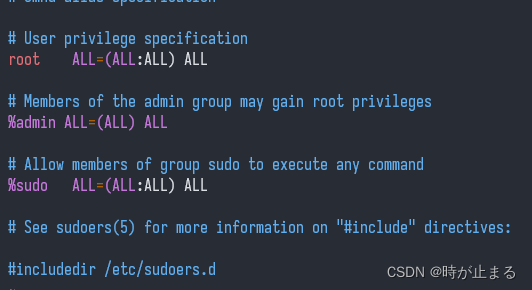1.Windows下安装Ubuntu
直接去微软商店搜索下载Ubuntu18.04就行,你也可以使用镜像
2.安装完毕后,进入ubuntu,更换apt源为阿里云源
- 备份 sources.list
sudo cp /etc/apt/sources.list /etc/apt/sources.list.bak
- 编辑 sources.list
sudo vim /etc/apt/sources.list
然后将下面的阿里源替换进去
deb http://mirrors.aliyun.com/ubuntu/ bionic main restricted universe multiverse
deb http://mirrors.aliyun.com/ubuntu/ bionic-security main restricted universe multiverse
deb http://mirrors.aliyun.com/ubuntu/ bionic-updates main restricted universe multiverse
deb http://mirrors.aliyun.com/ubuntu/ bionic-proposed main restricted universe multiverse
deb http://mirrors.aliyun.com/ubuntu/ bionic-backports main restricted universe multiverse
deb-src http://mirrors.aliyun.com/ubuntu/ bionic main restricted universe multiverse
deb-src http://mirrors.aliyun.com/ubuntu/ bionic-security main restricted universe multiverse
deb-src http://mirrors.aliyun.com/ubuntu/ bionic-updates main restricted universe multiverse
deb-src http://mirrors.aliyun.com/ubuntu/ bionic-proposed main restricted universe multiverse
deb-src http://mirrors.aliyun.com/ubuntu/ bionic-backports main restricted universe multiverse
- 更新以及升级
sudo apt update
sudo apt upgrade
3.创建root权限的用户,并且设置为默认登陆用户
- 创建用户
adduser username # 你的用户名
New UNIX password: # 随后按照提示输入密码等信息
- 赋予root权限
sudo vim /etc/sudoers

在文件的root ALL=(ALL:ALL) ALL 这一行下面添加(你的用户名 ALL=(ALL:ALL) ALL)
username ALL=(ALL:ALL) ALL
- 设置你的用户为默认登陆用户
sudo vim /etc/wsl.conf
写入以下内容(username记得替换成你的用户名)
#Set the user when launching a distribution with WSL.
[user]
default=username
完全退出系统后再进入就会生效
4.安装一些帮助操作系统的工具。
- 先安装一个oh-my-zsh,用着不好看的shell怎么好好工作(摸鱼)嘛。
#安装zsh,已经有zsh的话就当更新了
sudo apt install zsh -y
# 设置zsh为默认shell
chsh -s /bin/zsh
# 安装oh-my-zsh
sh -c "$(curl -fsSL https://raw.github.com/robbyrussell/oh-my-zsh/master/tools/install.sh)"
#(可选)进入配置文件设置主题
vim ~/.zshrc
具体主题安装可以参考
oh-my-zsh的wiki
2.安装zsh的一些常用插件
# Zsh命令自动补全插件
git clone https://github.com/zsh-users/zsh-autosuggestions $ZSH_CUSTOM/plugins/zsh-autosuggestions
# Zsh命令语法高亮插件
git clone https://github.com/zsh-users/zsh-syntax-highlighting.git $ZSH_CUSTOM/plugins/zsh-syntax-highlighting
# 用来在shell中提示node版本(也有其他的提示,可自行翻阅文档)
git clone https://github.com/spaceship-prompt/spaceship-prompt.git "$ZSH_CUSTOM/themes/spaceship-prompt" --depth=1
ln -s "$ZSH_CUSTOM/themes/spaceship-prompt/spaceship.zsh-theme" "$ZSH_CUSTOM/themes/spaceship.zsh-theme"
# 自动跳转目录插件
sudo apt install autojump
显示node版本还需要为spaceship创建默认配置文件
~/.spaceshiprc.zsh
,否则可能无法正常显示
SPACESHIP_NODE_ASYNC=false # 设置读取node版本不为异步读取
-
配置
~/.zshrc
文件
# 不需要提示node版本的话可以不用我现在这个主题
ZSH_THEME="spaceship"
# 添加zsh-autosuggestions以及autojump到plugins中
plugins=(
git
zsh-autosuggestions
autojump
)
# 输入v快速进入neovim
alias v=nvim
# 下面这行放在.zshrc文件的结尾
source "$ZSH_CUSTOM/plugins/zsh-syntax-highlighting/zsh-syntax-highlighting.zsh"
- 安装oh-my-tmux,美化一下tmux的界面!
cd ~
git clone https://github.com/gpakosz/.tmux.git
ln -s -f .tmux/.tmux.conf
cp .tmux/.tmux.conf.local .
5.准备前端代码工具环境。
-
安装Node版本工具Volta,参考
这里
的方法,node环境就准备好了。 - 安装pnpm以及yarn用来帮助安装node包。
# yarn 可以直接用npm下载
npm install -g yarn
# pnpm 可能会遇到网络问题,没有魔法的话只能多试几次了
curl -fsSL https://get.pnpm.io/install.sh | sh -
- 安装neovim,vim的项目已经不再维护了,neovim还很活跃(赞美大佬)!
sudo add-apt-repository ppa:neovim-ppa/stable
sudo apt update
sudo apt install neovim
-
neovim的配置,参考我的
vim编辑器配置
,然后将其导入neovim的配置
~/.config/nvim/init.vim
中,这里是为了和老版本兼容,当然你也可以用
init.lua
。
# 在init.vim中写入下面的内容引入之前vim的配置
source ~/.vimrc
好啦,前端需要的东西就这些啦,✿✿✿完结撒花✿✿✿
版权声明:本文为admin_jo原创文章,遵循 CC 4.0 BY-SA 版权协议,转载请附上原文出处链接和本声明。